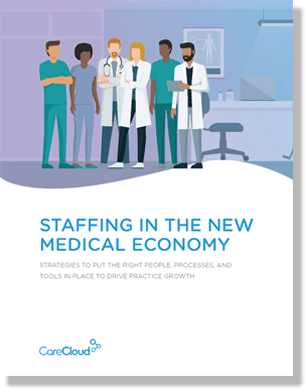There are apps to control nearly every aspect of your life – from Yelp telling me where to dine and get a haircut to more large-scale downloads, say Zillow’s Real Estate, which aids future homeowners nationwide.
Unsurprisingly, there is no shortage of mobile app choices for healthcare professionals either. According to a 2011 MobiHealthNews Report, more than 3,660 medical apps are available to iPhone users alone. Imagine the sum once Android totals are incorporated.
What role will apps play in the future of healthcare technology? Smaller administrative tasks are obvious – if I can handle personal finances on my smartphone, then it’s only a matter of time until practice managers begin doing the same for their patients.
Will apps change the game, so to speak, or will they simply result in more sensory overload?
Paving the Way
The App Store and the Android Market boast thousands of medical apps, and although most of them are still fitness and nutrition based, some apps can monitor blood glucose for diabetics or heartbeats and blood pressure during the night for women trying to conceive.
These kinds of applications allow a patient to view their health within a narrative context of sorts, creating the ‘story’ of your health. In addition, these initiatives work synergistically with big data trends in healthcare. These kinds of apps can be used to crowdsource valuable information for medical researchers and physicians alike.
In an article for Fast Company, Oscar-winning producer Edward Saxon suggests “the most profound medical applications are likely to involve a narrative – because we think in stories.” Saxon is currently working to help integrate moviemaking techniques into medicine at the University of Southern California.
Next, what if physicians at your practice suddenly stopped relying on bulky drug reference texts? An app like Medscape for iPhones boasts more than 7000 drug references, 3500 disease clinical references and 2500 clinical images and procedure videos. And let’s not forget the Epocrates app’s drug interaction tool checker and pill identifier.
While the consistent advancement of medical research makes doctors perennial students by default, it’s often cumbersome to lug heavy books around, so carrying thousands of volumes in your pocket isn’t a bad deal. The New England Journal of Medicine is one of myriad apps that can help with this issue.
Medical imaging apps have sprung up at impressive rates, too. Radiology 2.0 for iOS uses Yale University medical content to create case based imaging presentations. Developer 3D4Medical creates apps like Shoulder Pro, where doctors can manipulate nine 3D anatomical image layers of a human shoulder.
The Value of Medical Apps
Apple’s App Store recently launched a new section catered to healthcare professionals. This isn’t a shocker, per se. Manhattan Research predicted 81% of physicians would be using smartphones in 2012.
However, the use of medical apps remains in its prenatal stages, so to speak. Part of this lies in the spontaneous origins of their popularity – most physicians are learning about different apps via word of mouth.
How long will it be before an individual or group discovers how to better filter medical apps and rein in these off-the-cuff physician networks?
Medical apps provide professionals at your practice with a wealth of portable data. They typically boast very intuitive interfaces and offline usability, which eliminates the potentially devastating problem of dropped connections mid-procedure.
The goal is to build blockbuster medical apps. Ideas for combining medical apps with some sort of entertainment are floating around the industry, much to the dismay of healthcare purists. iPhones feature musical ‘whistle’ apps that test lung function and Microsoft Kinect games are prescribed by physical therapists to assist patients with rehab exercises.
Even entertainment is a tool, as is the app and the mobile device itself. And since the brain processes tools as transient body parts, data-driven and telemedicine apps help physicians become nearly omniscient and omnipresent.
In other words, all indications postulate apps will move from information retrieval to extensions of a doctor’s hands and eyes. Imagine how this will streamline your practice’s workflow.
Has your practice adopted mobile apps? What apps are best for you?



